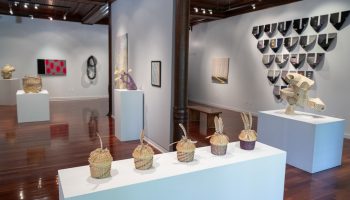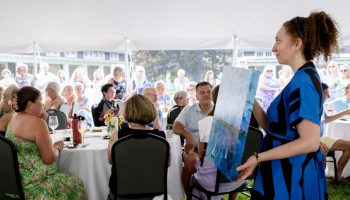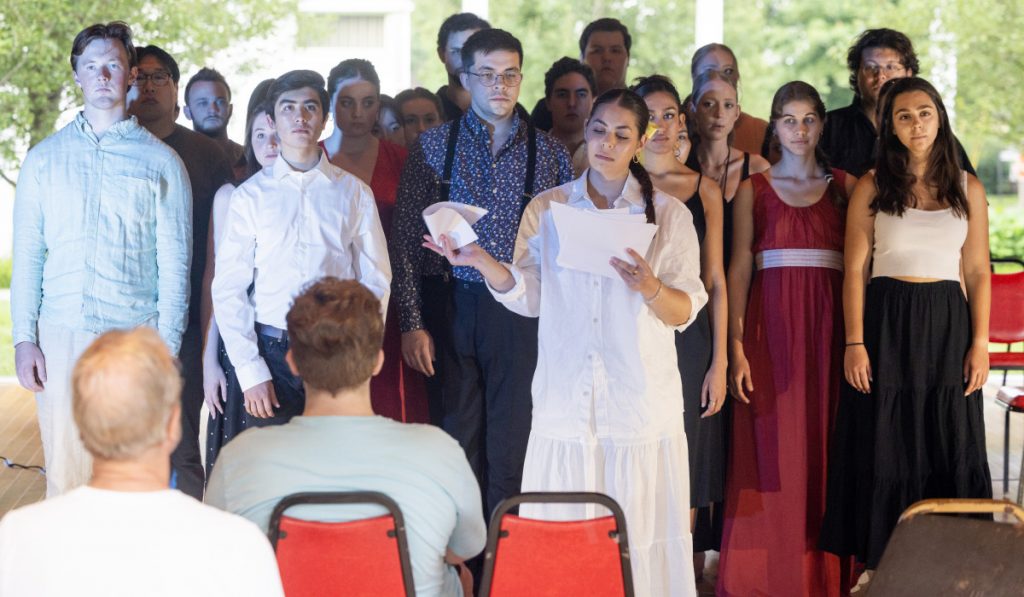
Zoe Kolenovsky
Staff writer
Voice students of the Chautauqua Opera Conservatory will return this evening for an encore performance of L’Enfant et les Sortilèges under the direction of Marcus Shields.
The opera, by Maurice Ravel and Sidonie-Gabrielle Colette, will begin at 6:30 p.m. tonight in McKnight Hall. It follows the story of a young boy whose naughty behavior leads to divine punishment in a magical twist of expectations.
“He throws a major tantrum and he basically, to take out his frustration, abuses and breaks … all of the objects in his room,” Shields said. “After he’s finished, all of these objects one by one come alive and in this progression, basically express their pain at what the child has done to them.”
Mezzo-soprano Anna Maria Vacca will be playing the role of L’Enfant, which she describes as both a challenge and a joy.
“It’s a demanding role,” she said. “The staging is very physical, so I’ve had to work to maintain my voice in a healthy way while also executing the physical performance.”
The community formed among the cast has been a very supportive one, which has helped her prepare for this evening’s show, she said.
“I’ve been able to lean on my colleagues,” Vacca said. “There’s something about the people here. There’s an energy that is very encouraging and supportive. It makes me want to be not only a better artist, but a better person.”
Her first leading role has been “really fulfilling,” she said.
“I’ve just learned so much through the process about performing and who I am as an artist,” Vacca said.
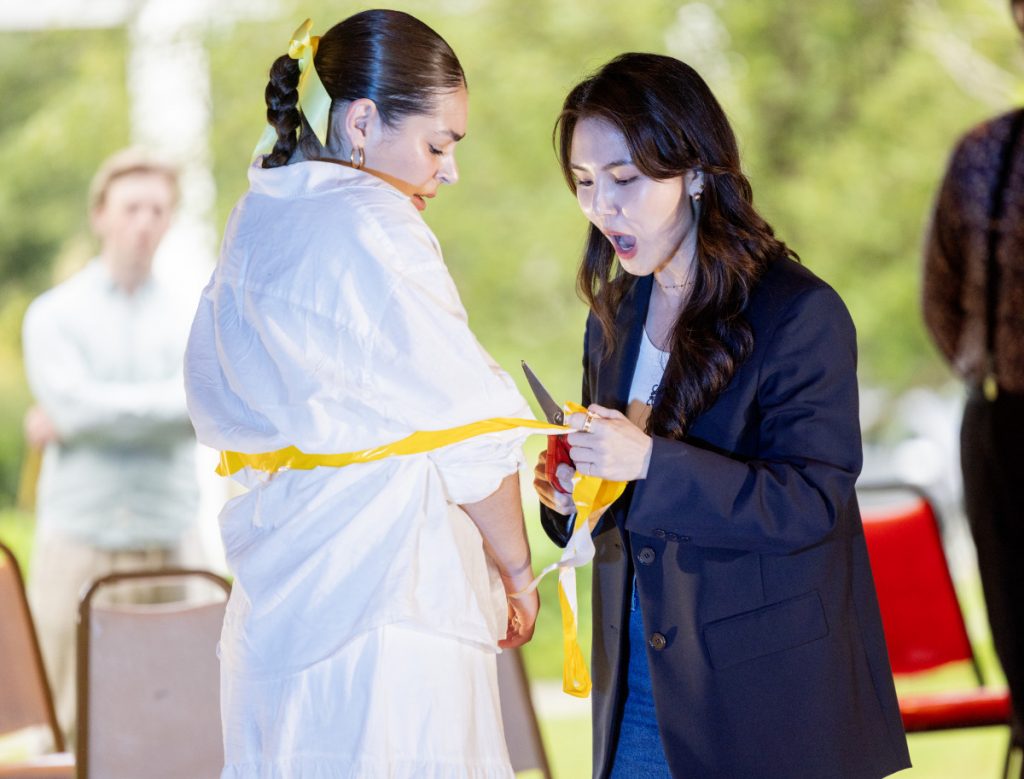
In addition to the “visceral” physical performance, Chautauqua can expect to enjoy the opera’s music, which Shields said has “every color that you can imagine.”
“The show was written in 1925, and the piece itself is in dialogue with all of the other musical styles that were happening,” he said. “So there’s jazz and there’s these elements of extra extended technique. … It’s classical music really stretching to its full width or breadth just to create this immense color palette and be able to make a story that creates these nature landscapes.”
“The musical variety of the piece is amazing,” said bass-baritone Fabian Balkhausen. “Ravel has a unique musical language and you have to be able to stretch your range. For my role, there are only three to four pages where I’m singing, but it covers more than two octaves of range.”
Balkhausen will be performing as Le Fauteuil, or “the armchair,” one of the objects in L’Enfant’s room that comes to life to punish him for his cruelty.
This punishment ultimately results in serious character growth for the child, which the cast agrees is representative of the transition from childhood to adulthood.
“At the beginning, he’s extremely angry and frustrated at his mom, at his life, and at his responsibilities,” Vacca said. “But by the end, he shows real love and kindness to the things that matter most to him. … He goes through a real arc.”
Tonight’s show is bittersweet, as the Conservatory will be wrapping up their summer season on Friday after seven weeks of training.
“There’s no question that there has been immense vocal growth,” said Shields. “The thing about a program like this is it’s seven weeks, very intensive, and you can’t help but be stretched and be challenged and to grow.”
“I’m very grateful,” said Vacca. “What you can gain as a student here, through the private lessons and coachings and taking part in multiple performances over just seven weeks, it’s a gift.”
Shields said the growth the students have displayed as vocalists and performers this summer is all the more impressive in the face of Chautauqua’s changing opera landscape.
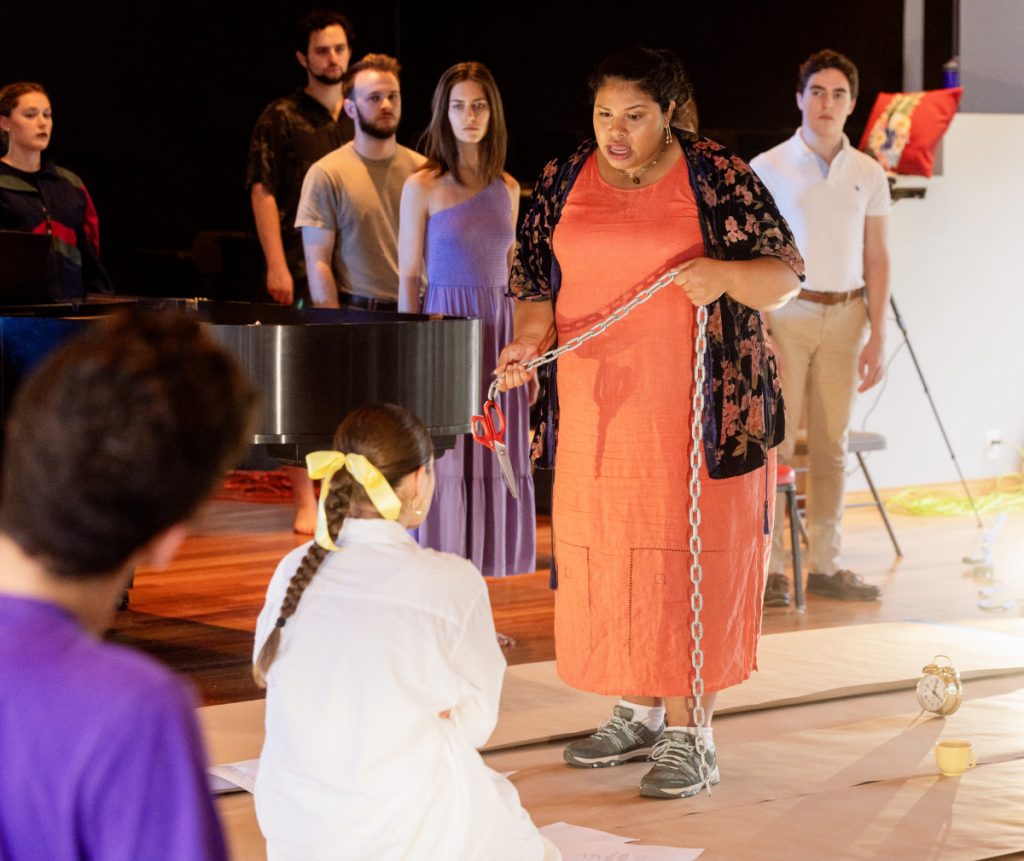
“There’s major transitions that are happening within this institution, which the students in the Conservatory have been well aware of the entire time, and it’s incredibly painful,” he said, and the news — announced in July — that Chautauqua Opera Company and Conservatory would shift to a workshop model by 2025, with significant cuts next summer, mirrors “the reality (that) they’re training to be in an art form that is sort of constantly facing these kinds of challenges, financial challenges.”
The Institution and the Opera Guild shared this week that work had started on staging an opera in the Amphitheater next year, but in the meantime, “the task in front of (the students) is to be the best version of themselves that they can be, and this production is a way to sort of demarcate a segment of that transition,” Shields said. “… I’m inspired constantly.”
Balkhausen said the shifting direction of the Chautauqua opera landscape has been difficult for the students to come to terms with, but has also pushed them to redefine their personal goals in a more meaningful way.
“The situation at Chautauqua as an opera performer has been hard to be around … but the spirit of the program is huge. There are so many great people here, and the faculty is one in a million,” he said.
“The main takeaway for me has been to remember why we do this,” he continued. “Focusing on the quality of sound, the beauty of your sound and the honesty of your sound, that will be a challenge that stays with me for a few years.”
“There’s no better place to make a piece like this than Chautauqua,” Shields said, “which is so filled with some special classical music magic.”


